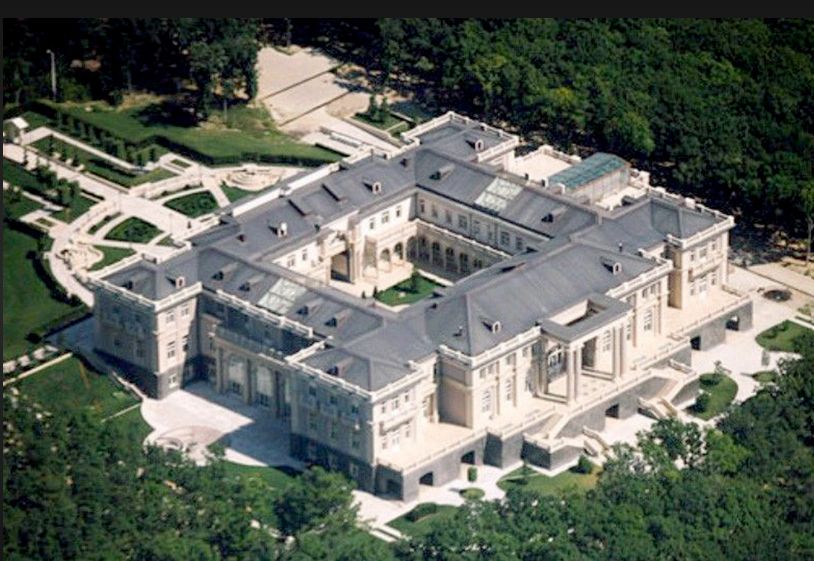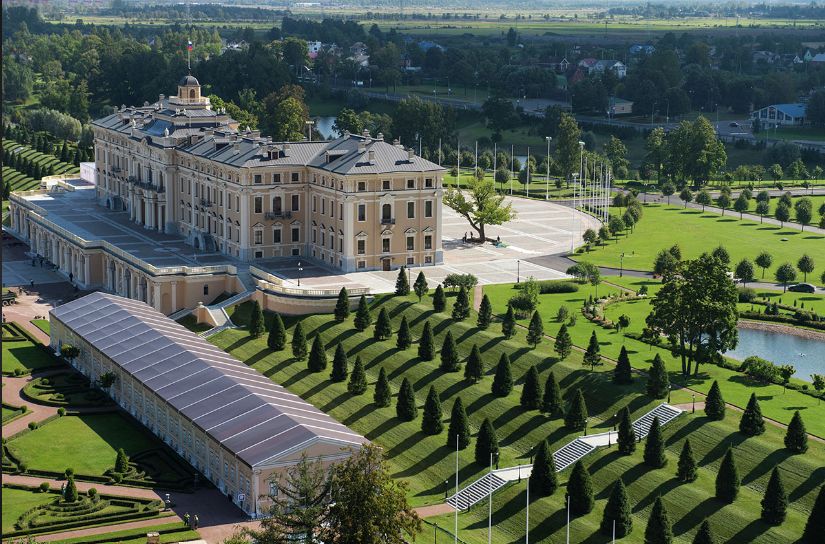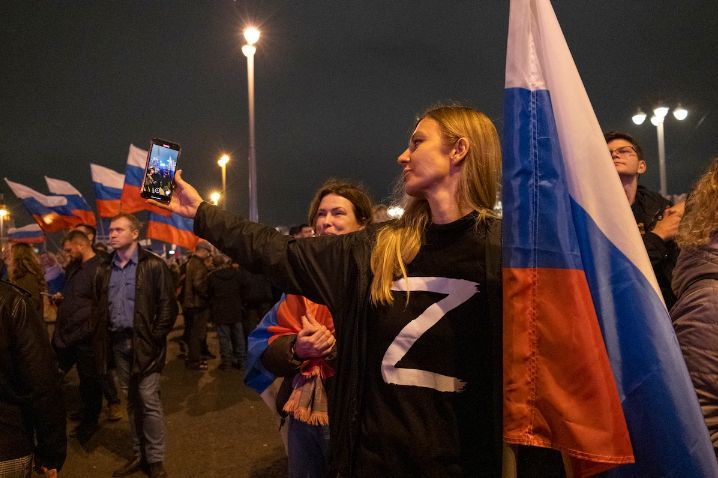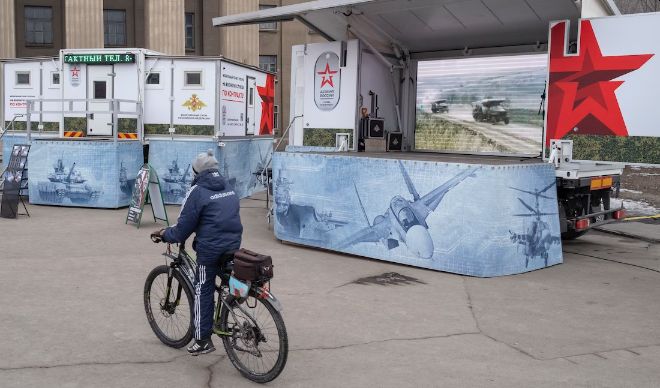By Eric Vandenbroeck
and co-workers
Russia's Patriotic Death Cult
The evening picture
underneath was taken on Russian National day, 12 June 2022. The reality is
that Russia can’t avoid trying to reassert power, and the West can’t avoid
trying to resist. But in the end, Russia can’t
win. Russia was and remains a country of
constant crises and wars, while the primary motivation to think about the
future stemmed from the economic problems of 1998 and 2008–2009. Putin’s
strategy has enabled Russia to reappear on the world stage in unanticipated
ways that will continue to challenge the world. It is also important to
remember that the Kremlin does not speak for all Russian
citizens.

President Vladimir Putin portrays himself as a new czar like Peter
the Great, the 15th-century grand prince known as the “gatherer of the
Russian lands.” But Putin’s year-long war in Ukraine has failed so far to
secure the lands he aims to seize, and in Russia, there is fear that he is
leading his nation into a dark period of strife and stagnation — or worse.
Some in the elite
also say the Russian leader now desperately needs a military victory to ensure
his survival. “In Russia, loyalty does not exist,” one Russian billionaire
said.
Putin’s full-scale
invasion of Ukraine began with hubris and a zeal to reshape the world order.
But even as he suffered repeated military defeats — diminishing his stature
globally and staining him with allegations of atrocities being committed by his
troops — Putin has tightened his authoritarian grip at home, using the war to
destroy any opposition and to engineer a closed, paranoid society hostile to
liberals, hipsters, and, especially, Western-style freedom and democracy.
Putin's home:


The Russian
president’s squadrons of cheerleaders swear he “simply cannot lose” in Ukraine,
thanks to Russia’s vast energy wealth, nuclear weapons, and the sheer number of
soldiers it can throw onto the battlefield. These supporters see Putin rising
supreme from Ukraine’s ashes to lead a swaggering nation defined by its
repudiation of the West — a bigger, more powerful version of Iran.
But business executives
and state officials say Putin’s position at the top could prove precarious as
doubts over his tactics grow among the elite. For many of them, Putin’s gambit
has unwound 30 years of progress made since the collapse of the Soviet Union.
Putin’s vision of Russia horrifies many oligarchs and state officials, who
confide that the war has been a catastrophic error that has failed in every
goal. But they remain paralyzed, fearful, and publicly silent.
“Among the elite, though
they understand it was a mistake, they still fear to do anything themselves,”
said the only Russian diplomat to publicly quit office over the war, Boris
Bondarev, formerly based at Russia’s U.N. mission in Geneva. “Because they have
gotten used to Putin deciding everything.”
Some are sure that
Putin can maintain his hold on power without a victory as long as he keeps the
war going and wears down Western resolve and weapons supplies. For
anyone in the elite to act, Bondarev said, “there needs to be an understanding
that Putin is leading the country to total collapse. While Putin is still
bombing and attacking, people think the situation is not so bad. There needs to
be a full military loss, and people will only understand they need to do
something.”
What all camps seem
to agree on is that Putin shows no willingness to give up. As Russia’s
battlefield position deteriorated in recent months, he repeatedly escalated,
shuffling his commanders, unleashing brutal airstrikes on civilian
infrastructure, and threatening to use nuclear weapons.
With his troops
reinforced by conscripts and convicts and poised to launch new offensives, the
70-year-old Russian leader needs a win to maintain his credibility. “Putin
needs some success to demonstrate to society that he is still very successful,”
a senior Ukrainian security official said, speaking anonymously to discuss
politically sensitive issues.
Moscow’s Glittering Indifference
As the casualties
mount in Ukraine, filling graveyards across Russia’s provinces, Moscow’s
glittering facade conveys a hedonistic, indifferent city. Its restaurants and
cafes are crammed with glamorous young patrons sporting European designer wear,
taking selfies on the latest iPhones, and ordering truffle pizza or duck confit
to be washed down with trendy cocktails.
But beneath, Putin is
creating a militarized, nationalistic society, fed on propaganda and obsessed
with an “existential” forever war against the United States and NATO. So far,
no one in officialdom has had the nerve to object — not publicly, at
least.
“Whatever he says,
it’s taken like this,” the editor-in-chief of Nezavisimaya
Gazeta, Konstantin Remchukov, said with a loud snap
of his fingers.
Since Putin rose to
the presidency in 2000, his legitimacy has been based on his popularity and
stature among the elite, buttressed by his ability to instill fear by stripping
some of their assets and throwing others into prison. The defeats in Ukraine
have dented him.
The president seems
forever haunted by the moment when as a young KGB officer serving in Dresden,
the Soviet Union “gave up its position in Europe” as the Berlin Wall collapsed.
And his pursuit of the empire lost with the subsequent Soviet collapse is
throwing his country back into a gray, repressive, isolated past. For Putin,
his efforts are a quest to the right what he has perceived as historical
wrongs. In his near-maniacal revisionist view, Ukraine has always belonged to
Russia.
But even if Putin
somehow forces Ukraine into capitulating and ceding occupied territory, those
in the elite who lean toward a more liberal society stand to lose the most.
Punitive Western economic sanctions are likely to remain in place, and some
oligarchs undoubtedly would be pressed to pay to rebuild Russia’s new lands.
Some analysts predict a sweeping purge of oligarchs, and others deem it
insufficiently patriotic.
There are shocking
glimpses of Putin’s new Russia: A couple in a Krasnodar restaurant was arrested,
handcuffed, and forced to the floor after being denounced to the police by an
eavesdropper who heard them quietly bemoaning the war.
An older woman on a
bus was dragged from her seat, thrown to the floor, and roughly
pushed out the door by passengers because she called Russia an empire that
sends men to fight in cheap rubber boots.
Videos purportedly
show members of the Kremlin-approved but technically illegal mercenary Wagner
Group executing “traitors” in beatings with a sledgehammer.
Former central bank
official Alexandra Prokopenko described an atmosphere
in which officials fear prison amid intimidation by the security services.
“It is a concern for
every member of the Russian elite,” said Prokopenko,
who is in exile in the West. “It’s a question of survival for high-ranked,
mid-ranked officials who all remained in Russia. People are quite terrified
about their safety now.” She said former colleagues at the bank told her they
saw “no good exit for Russia right now.”
Two-Pronged Backlash
Increasingly
isolated, Putin faces growing resentment from hawkish nationalists who say he
should have acted more radically to seize Kyiv and from a liberal-leaning
faction that thinks the war is a grave error. He has tightened his inner circle
to a few hard-liners and sycophants, ruthlessly eliminated opposition rivals,
and set up a formidable security apparatus to safeguard against any threat.
Pro-Kremlin analysts
see escalation — pumping in more soldiers and ramping up military production —
as the path to victory. That appears to fit Putin’s character.
But no one knows the
current military goal or what Putin might consider a victory. Some say he will
settle for seizing Ukraine’s eastern Donetsk and Luhansk regions, where Russia
began fomenting separatist war in 2014. Others say he has not given up his
designs on taking Kyiv and toppling the government.
In September,
Ukraine’s first big successful counteroffensive shone a harsh spotlight on
Putin’s instincts in a crisis: a bullish doubling-down designed to sever any
path to compromise. His illegal claim to annex four Ukrainian
territories, despite not controlling them militarily, was a burn-all-bridges
tactic meant to draw sharp new red lines on the map of Ukraine.
His speech on the occasion of the supposed annexations, in
the Grand Kremlin Palace’s St. George Hall, reached a new hysterical pitch over
what he called the West’s “outright Satanism” and its desire to gobble Russia
up and destroy its values.
“They do not want us
to be free; they want us to be a colony,” he said. “They do not want equal
cooperation; they want to loot. They do not want to see us as a free society
but a mass of soulless slaves.” He has repeatedly described a quest to
establish a multipolar world where Russia regains its rightful place among the
great powers.
A woman wears a shirt
marked with the Z insignia of Russia’s invading forces in Ukraine during a
celebration on Red Square of the illegal annexation of four Ukrainian regions
on 30 Sept.

Sometimes, Putin
sharply rebukes one of his officials about failures, leaving others fearful of
public humiliation. He elevates and rewards thuggish figures, such as Chechen
leader Ramzan Kadyrov and the Wagner founder Yevgeniy Prigozhin,
but swiftly curbs them if they step out of line.
At times, Putin seems
weirdly out of touch with the realities of his war. After pro-war bloggers
reported last week that dozens of Russian tanks and many soldiers were lost in
a failed attack on Vuhledar involving Russia’s elite
155th Guards Naval Infantry Brigade, Putin boasted to journalists that the
“marine infantry is working as it should — right now — fighting heroically.”
Meanwhile, a profound
pessimism has settled in the country. Those who believe the war is lost run the
gamut from liberals to hard-liners. “It seems it is impossible to win a
political or military victory,” one state official said, speaking anonymously
to offer a candid assessment. “The economy is under huge stress and can’t be
long under such a situation.”
Patriotic Death Cult
Publicly, Putin has
voiced no concern about Russia’s brutal killings of civilians in cities
including Bucha, Mariupol, and Izyum, while his propaganda machine dismisses
news of such atrocities as “fakes.” The International Criminal Court is
investigating war crimes in Ukraine, and the European Parliament has called for
a special court on Russia’s crime of aggression, the invasion of Ukraine.
But pro-Kremlin
analyst Sergei Markov said talk of war crimes prosecutions only stiffened
Putin’s resolve.
“What will Putin’s response
be? Fighting — and it doesn’t matter what the price will be,” Markov said.
Kremlin image-makers
convey Putin’s power in staged events where he looks like the archetypal
dictator — often a lone figure in the distance placing flowers at monuments to
past military heroes. His staged appearances with purported ordinary Russians
seem scripted and artificial, with participants simpering in nervous awe. The
same faces keep appearing in different settings — dressed as soldiers, fishers,
or churchgoers, raising questions about how many real people the president
ever meets.
As the war casualties
pile up, Putin and top propagandists extol a fatalistic
cult of death, arguing that it is better to die in Russia’s war than in a
car accident from alcoholism or cancer.
“One day we will all
leave this world,” Putin told a group of carefully selected women portrayed as
mothers of mobilized soldiers in November, many of them pro-Kremlin activists
or relatives of officials. “The question is how we lived. With some people, it
is unclear whether they live or not. It is unclear why they die, because of
vodka or something else. When they are gone, it is hard to say whether they
lived. Their lives passed without notice.”
A mobile military
draft office, with banners, video clips on a screen, and music to promote
enlistment in the Russian army.

But a man who died in
war “did not leave his life for nothing,” he said. “His life was important.”
Venerable rights
organizations such as Memorial and the Sakharov Center have been forced to
close. In contrast, respected political analysts, musicians, journalists, and
former Soviet political prisoners have been declared “foreign agents,” Many
have fled or been jailed.
As sanctions
slowly bite, prices soar, and businesses struggle to adapt, economists and
business executives predict a long economic decline amid isolation from Western
technology, ideas, and value chains.
“The economy has
entered a long period of Argentinization,” a second
Russian billionaire said. “It will be a long slow degradation. There will be
less of everything.”
Through the war,
Putin has profoundly changed Russia, clamping down harder on liberties and
prompting hundreds of thousands of Russians to emigrate. In the future,
pro-democracy liberals will not be tolerated, analysts say.
“The pro-West
opposition will be gone,” Markov said.
“Whoever doesn’t
support the special military operation is not part of the people,” he said,
using Putin’s term for the war.
But the second
Russian billionaire said he was convinced that someday, the country would
become “a normal European nonimperial country” and that his children, who have
U.S. passports, would return. “I want them to return to a free Russia, of
course,” he said. “To a free and democratic Russia.”
For updates click hompage here